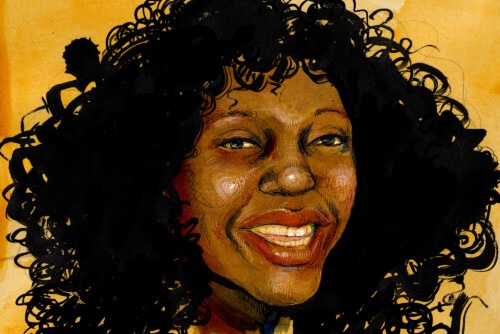To return to Chavez’s talk. He was presenting his work in the aftermath of Proposition 187, in a moment when Chicano Studies scholars turned renewed and outraged attention to the work of representation and, in particular, to how images and metaphors were mobilized to permit the renewal of a Nativist agenda that was then intensifying across the country. 1 Yet, in doing this work, the analysts of Prop 187 and its enabling culture have tended to ignore an odd part of the proposition’s history.
In 1991, during his first term as governor of California, Pete Wilson vetoed AB101, a bill to extend protection against discrimination on the job to gays and lesbians. In response to the veto, queers across the state took to the streets in nightly protests that snarled traffic in Los Angeles and San Francisco for two weeks. That West Hollywood queers were among the most active startled and scared the Republican political machine, since it depended on that particular constituency’s political docility to maintain a stranglehold over Southern California politics. The next year, convinced that his governorship was endangered, and stung by recession as well as a formidable Democratic opponent, Wilson signed virtually the same version of AB101. 2
He subsequently, and almost immediately, faced a different sort of crisis—the outrage of the Republican far right. Louis Sheldon of the Traditional Values Coalition released The Gay Agenda, a film deploring Wilson’s support of the legislation. The film depicts the AB101 protests alongside images of queers enjoying themselves in other, outrageous ways—in bars, at parades and so forth. The film, in Jaqui Alexander’s words, “spectacularizes yet again heterosexual anxiety in a manner that puts homosexuality on display” (199). It also tells us that Wilson supports and even encourages supposedly anti-family pleasure. Conservative groups around Southern California then began circulating calls for money to challenge Wilson in the next gubernatorial primary. Wilson’s strategy to placate his base entailed a brilliant change of subject. He shifted the locale for their homophobic anxiety rather than challenge its production. He supported, popularized, and campaigned for Proposition 187, an anti-immigration referendum that broadly refuted a century of U.S. thinking about citizenship and took as its charge the statewide regulation of immigration. It turned nurses and school teachers into immigration officials by charging them with surveillance responsibility, and it denied basic emergency care and benefits to all non-citizen immigrants regardless of how formal their status. 3
Perhaps the first emblem of the neoliberal structural adjustment programs that came home to the United States in the 1990s (like welfare reform a few years later), Prop 187 turned the focus off of Lou Sheldon’s gyrating gym boys protesting public policy and onto the abjected body of the poor immigrant mothers and children who were apparently sucking welfare money and hospital care from a then recession-weary state, as well as, and more particularly—the roving family-less migrant men who embodied, as they waited for work on a street corner, some sort of threat to the nation. The change of “subject” galvanized conservative support for Wilson, who went on to win re-election on Prop 187’s coattails.
This essay is not the place to reexamine the import of Proposition 187 in spurring a new Nativist agenda, but it is useful to note here that in virtually none of the analysis of either AB101 and its aftermath or Proposition 187 and its aftermath do the two come together. It may be that the linkage between the two is circumstantial, but that it has gone unexamined underscores an ongoing refusal to think about immigration and sexuality together. What I would like to suggest here then, is that this shift from AB101 to Proposition 187 was not merely or only a clever politician’s ruse. Rather, the homophobia generated around AB101 (and the notion of gay rights it solidified) helped sustain the anti-immigrant fervor that propelled proposition 187 from a crackpot, unconstitutional idea, into a widely-copied national platform for Wilson’s presidential ambitions. Wilson could change from gay rights to this particular subject because the homophobia generated in the family values response effectively produced a sense of fear and, as the film’s repeated jump shots suggest, social dislocation and dysphoria. What tied 101 and 187 together was in part the presumed assumption that both “the gay agenda” and the “immigrant agenda” took aim at the patriarchal white family, threatening to expose its homoerotic implications on the one hand, its vulnerability to multiple forms of desires, and on the other, its presumed status as a privileged, racialized site of consumption and protected locale for national reproduction. The move between 101 and 187 was not simply a shift from a battle over the regulation and production of citizenship to the sharpening of economic nationalism in nativist guise; it was also a signal of a vibrant relay that derives from, even as it enhances, a nationalist erotics.
- See Otto Santa Ana, Brown Tied Rising: Metaphors of Latinos in Contemporary American Public Discourse. Austin: University of Texas Press, 2002. Kent Ono and John M. Sloop, Shifting Borders: Rhetoric, Immigration, and California’s Proposition 187. Philadelphia: Temple University Press, 2002.[↑]
- Robin Podolsky, “Stretching the World,” LA Weekly, 15 November, 1991, 14; Doug Sadownick, “The Center Moves West,” LA Weekly, 15 November 1991, 14; Moira Rachel Kenney, Mapping Gay L.A.: The Intersection of Place and Politics. Philadelphia: Temple University Press, 2001. Jane Gross, “California Governor, in Reversal, Signs a Bill on Gay Rights in Jobs,” New York Times, 26 September, 1992.[↑]
- Wilson may have inadvertently signaled the connection between AB101 and Proposition 187 when he complained, in a major public statement, that immigrants came to the U.S. because of its “perverse incentives” (i.e., social welfare programs). Qtd. in Calavita, 289.[↑]



